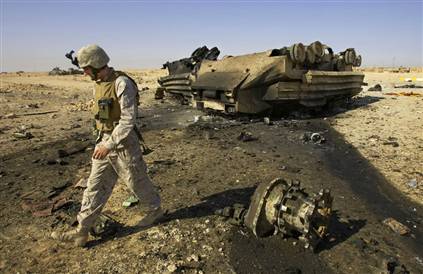WSJ Interviews Marine Corps Commandant James T. Conway
BY Herschel SmithThe Wall Street Journal has an outstanding interview with Marine Corps Commandant James T. Conway. The subjects are far ranging and weighty, one such subject being the current ‘heaviness’ of the Marines today. Planning for Operation Iraqi Freedom II and III didn’t consider the costs and equipment requirements of counterinsurgency, and consequently, 14 force recon Marines were lost in the summer of 2005 due to operating an Amphibious Assault Vehicle on a desert road.

So Commandant Conway takes on the issue of transport and protection.
One way the Marines are clearly changing is in the vehicles troops use to patrol in Iraq. “If you look at the table of equipment that a Marine battalion is operating with right now in Iraq,” Gen. Conway explains, “it is dramatically different than the table of equipment the battalion used when it went over the berm in Kuwait in ’03, and it is remarkably heavier. Heavier, particularly in terms of vehicles.
“I mean the Humvees were canvas at that point for the most part. Today they are up-armored and we’re looking at vehicles even heavier than that. We’ve got a whole new type of vehicle that we’re patrolling in, conducting operations in, that’s the MRAP [Mine Resistant Ambush Protected], a 48,000 pound vehicle. . . . these type of things, make us look more like a land army than it does a fast, hard-hitting expeditionary force.”
Gen. Conway commends the MRAP’s performance: “[W]e had over 300 attacks against the MRAP without losing a Marine or sailor.” And, he says, “We always have to be concerned about protecting our Marines. We owe that to the parents of America.”
“But,” he adds, “first we have to be able to accomplish our mission. And I think there are a lot of instances where a lighter, faster, harder-hitting force that gets to a scene quickly is more effective than a heavier, more armored force that gets there weeks or months later.”
It is clear that the MRAP can make it more difficult to maneuver in a battle zone. “We saw some problems with the vehicle once it went off of the roadways,” Gen. Conway says. “Its cross-country mobility, particularly in western Iraq where you have wadis [dry riverbeds] and small bridges and that type of thing was not what we hoped it would be.”
And it is something Gen. Conway has decided to have fewer of. He recently announced that the Marines are halting orders for these vehicles. The Corps will take delivery of a total of 2,300 new MRAPs by the end of the year, which it will use to conduct missions in Iraq. But Gen. Conway is canceling orders for 1,400 additional MRAPs that he and his advisors believe they will not need in the coming years. In the process, Gen. Conway is saving Uncle Sam $1.7 billion. “Yeah. I mean, that to me was a common sense kind of determination.”
The Multinational Force has addressed the issue of IEDs with interdiction, increased detection and armor, and targeting the networks of those who traffic in and emplace IEDs. However, the issue with AAVs and MRAPs is a symptom of the problem, as Conway expands into his real issue with the long-term constabulary role in Iraq.
“If you accept a generation of officers is four years,” Gen. Conway says, “that’s what an officer signs on for, we now have that generation of officers — and arguably troops — that have come and gone, that are combat hardened, but that will never have stepped foot aboard ship. . . . an amphibious operation is by its very nature the most complicated of military operations; and that we have junior officers and senior officers who understand the planning dimensions associated with something like that, that have sufficient number of exercises over time to really have sharpened their skills to work with other services to accomplish a common goal — these are the things that concern me with the atrophying of those skills and the ability to go out and do those things.”
Conway ends his interview saying that COIN operations in Iraq are exactly what the Marines need to support because of the compelling national interests. I have argued for commitment to completion of OIF, although reduced civil affairs missions and an eventual end to constabulary operations in favor of assistance to the Iraqi army and police for kinetic operations and border security. However, the corollary to this argument is a re-commitment to the COIN campaign in Afghanistan. Not only would this be a change from urban warfare (MOUT), but from the perspective of the future of Afghanistan, increased force projection is required.
The entire interview of well worth the time to read, and we support not only Conway’s commitment to the campaign in Iraq, but the upcoming deployment of Marines to Afghanistan. This commitment to Afghanistan should increase over 2008 and 2009. However, in the end, Conway is right to be concerned about maintaining the capabilities of the Corps. This will require commitment to MEUs, rapid assault and deployment, amphibious training and retaining the expeditionary flavor of the Corps.





Trackbacks & Pingbacks
Comments
RSS feed for comments on this post. TrackBack URL
Leave a comment